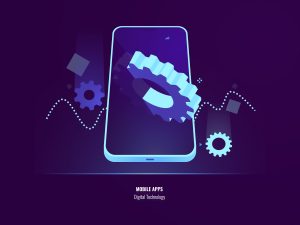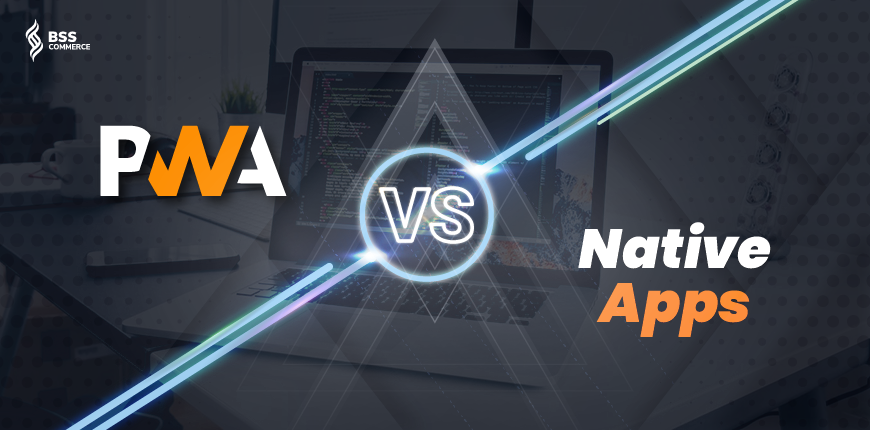PWA vs Native Apps is getting more and more common to e-commerce store owners. It’s essential to update with these platforms now or never since the number of mobile users is drastically increasing. In fact, the amount of content people consume on mobile is twice as much as they do on desktop.
Together with this development, there’s a big question in the market: should you choose PWA or Native App for your website? Some say that PWA is the future of the mobile web and this platform is replacing Native Apps day by day. Which one is true?
To clear all the confusion, in this article, we will point out the key differences between PWA vs Native apps. After all, you need to understand them to choose the right one for your store.
READ MORE All Magento 2 Features you must know to grow hacking your business!
What Are PWA vs Native Apps?
Table of Contents

If you do a quick search for the terms “PWA vs Native Apps”, you’ll receive thousands of results. Undoubtedly this is a controversial topic that hasn’t shown any sign of cooling down.
To take steps into this battle, make sure you get their definition clearly before digging any deeper to avoid misunderstandings.
PWA (Progressive Web App)
PWA is a mobile application built on JavaScript frameworks. It runs on a website foundation while providing native apps’ themes and functions. The aims of PWA are to boost user experience and increase website engagement.
In order to be approved as a PWA, a website needs to fulfill a checklist by Google. After which, the website must be:
-
- Reliable – Load instantly and never show the downasaur, even in uncertain network conditions.
- Fast – Respond quickly to user interactions with silky smooth animations and no janky scrolling.
- Engaging – Feel like a natural app on the device, with an immersive user experience.
Although PWA is still being improved, some benefits are still limited compared to Native Apps, especially on iOS.
START Magento 2 PWA NOW and embrace the improvements of this trendy technology over traditional websites!
Native Apps
A native app is an application for a certain mobile device (tablet, smartphone, etc.). You need to install native apps onto the device before starting to use them. Users can acquire the apps from an online store or marketplaces like The App Store or Google Play Store.
A native app is developed for both iOS and Android. This platform performs perfectly on any type of device. In 2016, native apps made up 87% of all mobile traffic.
The Different Between PWA vs Native Apps
Not just the definition, Progressive Web Apps vs Native Apps are different in certain aspects. Only by clearly identifying these characteristics can you answer the question of when to use PWA and when to use Native apps.
Development process

Native apps vs PWA are different right from the development process.
Native apps are developed to run inside a web browser while progressive web apps are written for mobile devices. With Native Apps, the programming language is based on the language of each platform (Objective-C and Swift for iOS; Java for Android).
At the same time, PWA is written using HTML, CSS, and JavaScript.
In terms of development cost between PWA vs native apps, developing a PWA is cheaper.
This is because you can build PWA directly on the website. On the other hand, with Native Apps, you need at least two versions for iOS and Android.
The process would require you to learn the language of each platform, not to mention the resources for updates and maintenance. If you are building a complex application, this will not only cost a fortune but also require a lot of time and effort.
As a result, PWA is both cheaper and faster to build. For various platforms, you just need one single codebase and configure your website with helpful tools to build the PWA. Thanks to the responsive design, just one version of PWA will be available for all devices.
Distribution

This process is greatly different between PWA vs native apps. With each version of the native app, you need to submit them to different App Stores and pass certain requirements of each platform to get published.
The most popular stores are the App Store and Android Play Store, but you can also consider Amazon Appstore, Windows Store, and more. Some platforms also require a registration fee to create a developer account.
Meanwhile, with PWA, you can skip all the troublesome steps. All you need is a web browser and a URL to get the PWA published. It’s very convenient since many popular browsers are now supporting PWA, like Chrome, Firefox, Safari, just to name a few.
This will shorten the time you build and introduce the app as well as the time for updates, which makes it easier for both developers and users.
However, high security is compulsory for a PWA. You may skip a few steps but still need to make sure the quality of the app is met, or else the website will not receive approval as a PWA. So it doesn’t mean that publishing a PWA is easy. Both PWA vs native apps have their own requirements to fulfill.
Discoverability

One important note is that Native apps will not show up in the search engine. You can reach your users through the App Store only. You may try to make your apps more reachable with App Store Optimization (ASO).
ASO is the way you can enhance your rank in-store search. ASO includes keyword research, title and meta description, screenshots, and relevant categorization. This would be effective but you also need to consider the extra time and cost to carry out those actions.
Meanwhile, PWA can be indexed in search engines since they are still a website. It’s even more effective for the PWA page to increase engagement and raise your rank in search results. Make sure you know how to implement powerful SEO structures and tools to take the best advantage of this feature.
Both ASO and SEO bring different benefits just like PWA vs native apps. You should carefully consider your target purpose to decide which technique to focus on.
READ MORE SEO For Ecommerce Guide to optimize SEO better in your store!
Security

If you compare it to a normal web app, PWA security is more strict since they have to run under HTTPS. This ensures that no exchanges between users the servers are interfered with. A HTTPS website is a guarantee for customers to enter their personal information without the fear of being stolen.
In the meanwhile, with native apps, you have more options with many security measures. You can require functions like Multi-Factor Authentication, Two-step Verification, etc. In addition, an app has the tendency to gain more trust than a URL because it needs to pass the security requirements of the App Store before being launched.
Installation

It’s the fact that the installation process to take before you can use a native app would require a certain level of commitment from users. This is a vital factor between PWA vs native apps in terms of customer satisfaction.
With native apps, first, you have to look for the app in the App Store. After that is the download and installation process. When the app is set in the device, users need to grant certain permissions and fill in some information before starting to enjoy the app.
On the contrary, there’s no process such as PWA installation. Just by one tap, users can add the app to their home screen. The app performs just like the native apps that could have taken them a cumbersome process to set in their phones.
Furthermore, a PWA is a memory saved platform that’s easy to share via an URL. There’s also no need for the update because developers will take care of it in the background.
Performance

The speed of PWA vs native apps is much faster since PWA is developed to improve customer engagement. This is because the scripts that run in the background are separated from the web page.
Moreover, Service Workers allow you to manage offline data and cache resources so that it doesn’t affect site loading time. PWA is also available in offline or poor network conditions.
With Native Apps, although site loading time can’t be instant compared to PWA, it provides a better experience. Thanks to the ability to access the device’s hardware and develop more powerful features, native apps make sure all the benefits are well delivered to your users.
Geofencing feature

This function is extremely beneficial to engage customers anytime, anywhere. Geofencing allows developers to set up virtual boundaries that would trigger phone actions if users show up inside the area.
This feature works best in combination with Push notifications. However, this is not one of PWA’s features since geofencing is currently only available for native apps.
When To Choose PWA vs Native Apps?

With different purposes, both PWA vs native apps has their pros and cons. On choosing between PWA or native app, besides the features of each, you should also consider your vision and target customers.
Go for PWA if you have just started with a limited time and budget to catch up with the market. Also, if you want a simple app to raise brand awareness and SEO ranking then PWA is the right decision.
Your option should be a native app if you want to build credibility for your website. This is because once you are published on App Store, you’re officially approved and that incredibly increases your reliability.
Furthermore, native apps help you to utilize smartphone features and provide space for products that require great computing power.
Also, SKIM THROUGH AMP vs PWA differences for more diverse options to develop your website.
Last words
Although both PWA vs Native apps prove great benefits in unique aspects, the decision to choose between them should be based on your practical vision and resources.
READ MORE Guide To Hire SEO Agency if you need professional help with the SEO in your store!
BSS Commerce is one of the leading Magento extension providers and web development services in the world. With experienced and certified Magento developers, we commit to bringing high-quality products and services to optimize your business effectively.
CONTACT NOW to let us know your problems. We are willing to support you every time.
